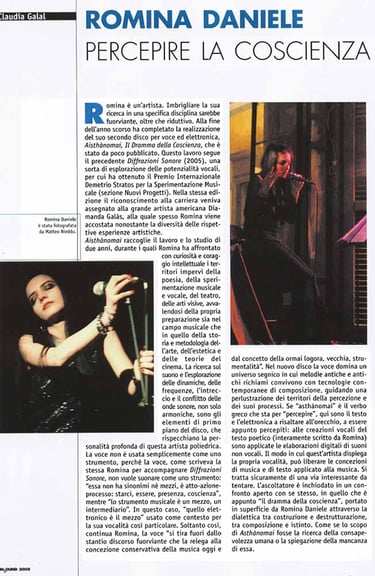
Insound Magazine: To Perceive Consciousness
On page 85, the article by Alessandro Michelucci
ARCHIVE: NEWS 2005-2016PRESS REVIEW PRE 2016
APRIL 2008
Insound Magazine:
To Perceive Consciousness
On page 16, the article by Claudia Galal:
Romina is an artist. To confine her research to a specific discipline would be misleading, as well as reductive. At the end of last year she completed her second album for voice and electronics, Aisthanomai, The Drama of Consciousness, which was recently released. This work follows the previous Diffrazioni Sonore (2005), a sort of exploration of vocal potentials, for which she obtained the Demetrio Stratos International Prize for Musical Experimentation (New Projects section). In the same edition, the prize for the career was
assigned to the great American artist Dia-manda Galàs, to whom Romina is often compared despite the diversity of their respective artistic experiences.
Aisthanomai collects the work and study of two years, during which Romina faced with curiosity and intellectual courage the impervious territories of poetry, musical and vocal experimentation, theatre, visual arts, making use of her own preparation both in the musical and in that of the history and methodology of art, aesthetics and of cinema theories. The research on sound and the exploration of dynamics, frequencies, the intertwining and conflict of sound waves, not only harmonics, are the leading elements of the album, which reflect the profound personality of this multifaceted artist.
The voice is not used simply as an instrument, because the voice, as Romina herself wrote to accompany Diffrazioni Sonore, does not want to sound like an instrument: "it has no synonyms or means, it is act-action-process: being there, being, presence, consciousness" while "the musical instrument is a means, an intermediary. In this case, "the electronic one is the medium used as a context for his very particular vocality. Only in this way, Romina continues, the voice can "extract itself from the stale misleading discourse that relegates it to the conservative conception of music today and from the concept of the now worn-out, old, instrumentality". In the new album the voice dominates a universe of signs in which ancient melodies and ancient references coexist with contemporary composition technologies, leading a reconnaissance of the territories of perception and its processes. If "asthânomai" is the Greek verb which stands for "to perceive", here it is the text and the electronics that stand out to the ear, that are perceived: onto the vocal creations of the poetic text (entirely written by Romina), digital and non-speech sounds elaborations are created. The way in which this artist unfolds his vocality can liberate the conceptions of music and text applied to music. This is certainly an interesting route to try. The listener is stuck in an open confrontation with himself, in what is precisely "the drama of conscience", brought to the surface by Romina Daniele through the dialectic between construction and deconstruction. between composition and instinct. As if the purpose of Asthânomai was the search for human awareness or the explanation of the lack of it.





